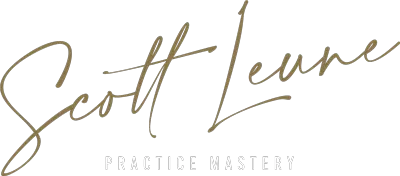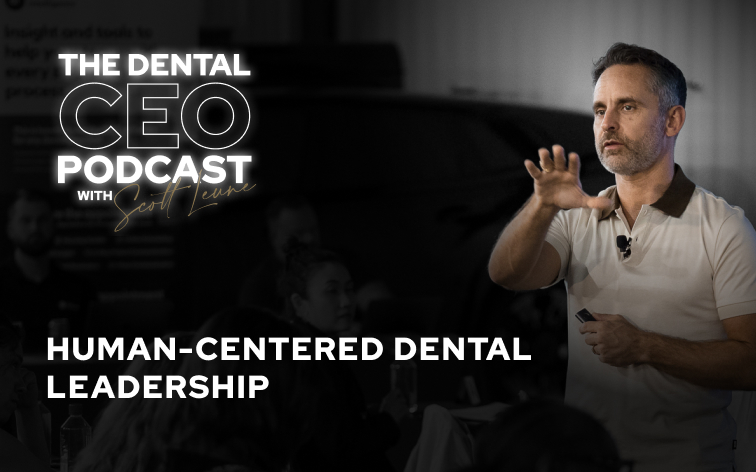How Human-Centered Leadership Can Fix the Dental Staffing Crisis
Dental leaders often look to systems, strategies, or technologies to solve their biggest challenges. But what if the real solution starts with something far more human? In this episode of The Dental CEO Podcast, Dr. Scott Leune sits down with leadership expert Ryan Estis to explore why traditional leadership models are failing—and how embracing human-centered leadership can unlock growth, engagement, and lasting impact in your dental practice.
Inside the Episode: Why This Conversation Matters
This episode of The Denatal CEO Podcast is more than a casual chat—it’s a masterclass in modern leadership for dental professionals. Dr. Leune brings on Ryan Estis, a renowned leadership coach and former Fortune 500 executive, to tackle the root causes of the staffing crisis, employee disengagement, and cultural stagnation affecting dental teams nationwide.
Together, they unpack how empathy, trust, and growth-centered coaching can reshape not only your team culture—but your entire business trajectory. If you’re struggling with dental staff recruitment, retention, or low team morale, this episode delivers actionable insights that can change your approach starting today.
Unlock the leadership strategies that matter—join Dr. Scott Leune’s webinars and start building a team that stays, grows, and thrives.
The Minds Behind the Mic
- Scott Leune isn’t just a dentist—he’s a practice performance strategist who understands the operational pressure dental entrepreneurs face. In this episode, he’s less a host and more a translator—helping dentists connect lofty leadership theory to day-to-day realities in the operatory.
- Ryan Estis brings executive experience and street-level leadership wisdom. From his roots in corporate sales to becoming a thought leader in organizational culture and performance, Ryan’s message is clear: if you want teams that thrive, lead like a human, not a boss. His book Prepare for Impact captures these principles in depth.
Highlights That Hit Home
We’re not just running companies. We’re shaping lives.
Scott reflects on Ryan’s central belief: that human-centered leadership means viewing your practice not as a machine for productivity, but as a place where people grow. Every decision—from how you handle conflict to how you train your team—is either building someone up or breaking them down. The measure of success isn’t just profitability. It’s whether your employees and patients are better because they were part of your organization. For Scott, this mindset is a shift from transactional dentistry to transformational leadership.
Staff don’t just want a job—they want to belong.
Ryan explains that today’s workforce isn’t motivated by hierarchy or command-and-control leadership. They’re looking for meaning, recognition, and purpose. Scott sees this as a wake-up call: if your employees don’t feel emotionally connected to your practice, they won’t stay long—and they won’t give their best while they’re there. Belonging starts with being seen and heard, which means dentists must step out of the operatory and into real conversations that foster trust.
Retention isn’t a perk—it’s a plan.
Scott emphasizes that keeping great employees doesn’t happen by accident. It takes structure. Ryan’s advice? One meaningful conversation per employee per week. It sounds simple, but this “one-a-week vitamin” has been shown to be the most effective lever for performance and engagement. Scott adds that growth plans, coaching, and feedback loops must become part of your operating rhythm. If you’re not actively developing people, you’re passively losing them.
What’s your team’s business plan?
Dentists obsess over production numbers, treatment acceptance, and schedule gaps—but often neglect to set goals for the people delivering the care. Scott agrees with Ryan: your front desk, hygienists, and assistants should each have their own development plan. What are their goals? What skills are they building this year? Are they growing professionally and personally? Without these plans, your team isn’t growing—they’re just clocking in.
Stop avoiding the hard conversations.
Scott calls out a critical leadership blind spot: the tendency of dentists to avoid management by burying themselves in clinical work. Whether it’s correcting behavior, resolving tension, or simply offering praise, these conversations are uncomfortable—but they’re the essence of real leadership. You can’t scale a practice if you’re unwilling to engage with your team beyond the treatment plan. As Scott puts it, “Leadership isn’t the thing you squeeze in between patients—it is the thing.”
This is what high-trust culture looks like.
When employees know you’re invested in their future, they return that loyalty tenfold. Scott shares how understanding someone’s personal goals—like saving for a dream trip or developing new skills—can transform the workplace dynamic. It’s not about offering free snacks or team lunches; it’s about crafting a relationship that outlasts the paycheck. Ryan’s story about supporting an employee’s dream to move to Hawaii illustrates the power of purpose-driven culture. Employees who feel truly valued won’t leave for $1 more an hour. They’re in it for more than money.
Empathy isn’t optional. It’s learnable.
One of the episode’s most striking moments comes when Ryan recalls a CEO saying, “I just don’t have empathy.” His response? Empathy is a skill, not a personality trait. Scott reinforces that point: the emotional demands of leadership are real, and ignoring them is a fast track to team dysfunction. Whether it’s navigating burnout, conflict, or career growth, the ability to listen, connect, and respond with care is no longer optional in dental practice leadership. It’s a must-have competency—and it can be learned.
Level up your practice and your leadership—read Dr. Scott Leune’s blog for real-world insights that drive team performance, growth, and patient trust.
Your Leadership Challenge: Final Takeaway
Dr. Leune ends the episode with a clear call to action: Create the kind of practice where your people are proud of who they’re becoming—not just the paycheck they’re earning. When your culture centers on development, empathy, and trust, you stop competing on wages and start becoming a magnet for mission-driven talent.
Dentistry doesn’t need more management tactics. It needs leaders who see the whole person. Who believe leadership is a relationship. Who ask every day:
- “Who did I impact today?”
- “How will I be remembered by the people I led?”
That’s human-centered leadership. And it’s how dental practice leadership needs to evolve—starting now.

